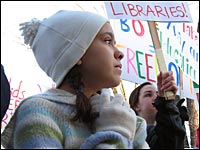I'd like to think that dozens of IAG readers have been wondering where Alane is, but I suspect--no, I am positive--that is not the case. Well, I suppose all of us, actually, have been posting infrequently and/or sporadically. I think there are several reasons for this.
One would be the obvious "we're really busy" because we really are. I think all of us have big projects we are managing or participating in as well as any number of the usual workplace busy tasks--and the latter are definitely not worth writing about.
The second is, perhaps, that the biblioblogosphere is a rich and varied place these days, full of interesting voices and writing, and increasingly, overlap in subjects addressed. In May 2004 when we began, there were far fewer people writing about library matters and things that matter to libraries which meant, quite honestly, less competition for eyeballs. We are generalists here at IAG and so appeal to all or no one. Also, when we began, we were the only OCLC staff blogging as OCLC staff and that is not so three years later. There are
nine blogs* written by people who clearly or slightly less clearly work for OCLC. (And there are, of course, personal blogs written by people who work at OCLC.)
The third is....ennui? Februaryitis?
And fourth, for me, is that much of what I am reading and thinking about is related to our forthcoming report. So, while I am reading truly fascinating, thought-provoking stuff, I am loathe to share at this point as I, selfishly, want everything to be fresh when we publish the report. But, this is probably silly because not all IAG readers will read the report and it's also a really old way of thinking about writing. Chris Anderson basically wrote
The Long Tail as his blog and this didn't dilute the resulting book a whit. There are other similar examples.
OK, I'll share....just not today.
Today, Ben McConnell from
Church of the Customer is here at OCLC in Dublin to speak to staff and interested outsiders about his and Jackie Huba's new book,
Citizen Marketers. "A solitary citizen today with a broadband connection and a few cheap tools has a substantially better chance of influencing the public's perceptions of billion-dollar corporations than ever before. With a voice, a vote and a vocation, tens of millions of Americans are involving themselves in the cultural lives of business. The "social media" of blogs, podcasts and social networks are fusing pop culture with traditional marketing, and it's causing all manner of disruption."
Looking forward to this!
*That's not a test. They are
Lorcan Dempsey's weblog,
Outgoing,
Weibel Lines,
Hanging Together,
BlogJunction,
Walt at Random and
Libraryman. Updated! How could I have forgotten
025.431: The Dewey Blog. Sorry, Dewey Manor dwellers!


